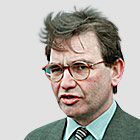Maria Fyfe, who has died aged 82, was a campaigner for women’s rights and many other progressive causes who served as Labour MP for Glasgow Maryhill from 1987 to 2001.
It was a mark of the challenge she faced that when elected in Labour’s Scottish landslide of 1987, she was the only woman in the 50-strong cohort that made its way to Westminster. She was only the 10th-ever female Labour MP from Scotland.
Maria decided “this has to change” and one of her proudest legacies was to play a major part in ensuring – via her work in the Scottish Constitutional Convention and working groups – that by the time Labour legislated for devolution a decade later, it was committed to gender balance in candidate selection for the Scottish parliament.
From 1988 until 1991, before resigning over the first Gulf War, Maria was on Labour’s frontbench as deputy to Jo Richardson, campaigning on women’s rights as deputy shadow minister for women – a job she loved and to which she brought decades of experience. Her first successful foray into such campaigning had been in the late 1950s as a young clerk working for the Gas Board, when she challenged the fact that male clerks were paid more than their female counterparts.
After she sought support through the Nalgo union, various men at the Gas Board opposed her stance on that grounds that “they wrote the letters and we only typed them”. Maria therefore organised her colleagues to type the letters exactly as given to them, spelling and grammatical mistakes included. Male resistance collapsed within a day and equal pay for equal work became Gas Board policy throughout the UK.
Maria’s socialism was grounded firmly in her own experience. She was born in the Gorbals in Glasgow. Her father, James O’Neill, was a tram driver, and her mother, Margaret (nee Lacey), managed a shop. It was an Irish Catholic background and Maria spent the second world war years with relatives in Donegal. In the great postwar building boom, the family secured a council house with a bathroom and garden in the new Pollok housing scheme, then on Glasgow’s fringes.
This transformation gave her a happy upbringing which she attributed, along with the NHS, to the work of a Labour government. She went from Notre Dame High school to a secretarial course, though her real ambition was to be a journalist. Her activism grew through trade union work and she met Jim Fyfe, whom she married in 1964, on an early anti-apartheid demonstration.
It was Labour’s general election defeat in 1959 and a book by Mark Abrams and Richard Rose called Must Labour Lose? (1960) that propelled her into membership of the Labour party, where she immediately applied her politics to the basic issues that affected working-class people. Though firmly of the left, Maria was never factionalist and worked with all of her comrades, locally and nationally, for practical outcomes.
Her husband went to Strathclyde University to obtain a degree and Maria then followed the same path at the same insitution, graduating in economic history. This led her into lecturing in trade union studies at the Central College of Commerce in Glasgow. In 1980 she was elected to Glasgow city council, and on becoming chair of the manpower committee (on condition its name was changed to personnel committee), she initiated an “equal pay for equal work” review that had far-reaching implications throughout Scottish local government.
Maria’s opportunity to win election to Westminster arose unexpectedly when the sitting MP for Glasgow Maryhill, Jim Craigen, stood down before the 1987 general election. Between selection and election, Maria’s husband died. Still a councillor, holding down a job and now a parliamentary candidate, she later said there was “no time for grieving”. Although Maryhill was a safe Labour seat, she took nothing for granted. “Campaigning then was different,” she said. “It was grounded in issues that affected people’s lives and not just saying ‘vote for us’.”
Maria was no respecter of reputations when it came to women’s rights. When Sean Connery repeated his view that women sometimes needed “an openhanded slap”, she tabled early day motions inviting the SNP, of whom Connery was a vocal supporter, to disown him. In 1997 Scottish Office ministers inherited recommendations for the honours list, with Connery down for a knighthood. When Maria became aware of this, she made her views known very firmly and his name was dropped, although Connery was finally knighted under a Labour government after devolution.
Another campaign she led was against the blacklisting of political activists by the right-wing Economic League. After the organisation’s practices were exposed by the World in Action television programme, Fyfe took up the cause in parliament and bombarded prominent UK companies with demands for information about financial support for the League, which withered away under the glare of publicity.
After retiring from the House of Commons in 2001, Maria remained active in many causes. At the time of the Scottish independence referendum of 2014 she edited a volume of essays entitled Women Saying No: Making a Positive Case Against Independence. Her own contribution to the book argued that all progress for women’s rights had been achieved on a UK basis, often with Scotland by no means in the vanguard.
She also led a successful effort to have a statue erected in Govan to Mary Barbour, a Red Clydesider who led a rent strike in 1915 and became one of Glasgow’s first Labour councillors five years later. Unveiled in 2018, it serves as a memorial not only to its subject but also to Maria’s commitment and consistency.
She is survived by two sons, Stephen and Chris, and four grandchildren.
• Maria Fyfe, politician, born 25 November 1938; died 3 December 2020
• This article was amended on 8 December 2020 to correct an editing error. The reference to a Labour landslide in 1987 referred only to the party’s performance in Scotland.











